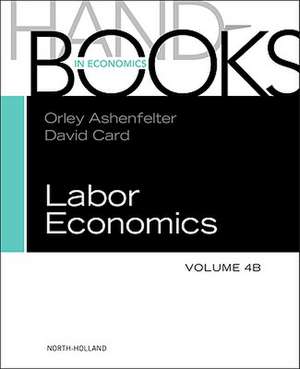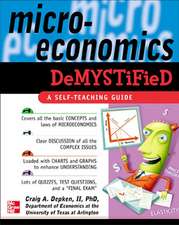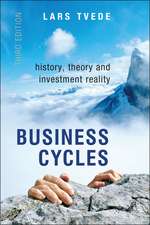Handbook of Labor Economics
Editat de Orley Ashenfelter, David Carden Limba Engleză Hardback – 9 noi 2010
- Concentrates on empirical research in specific labor markets, including those defined by age, gender, and race
- Reveals how questions and answers about these markets have changed and how models measure them
- Documents how conceptual models and empirical work explain important practical issues
| Toate formatele și edițiile | Preț | Express |
|---|---|---|
| Hardback (2) | 717.68 lei 36-50 zile | |
| ELSEVIER SCIENCE – 7 noi 2010 | 717.68 lei 36-50 zile | |
| Elsevier – 9 noi 2010 | 729.09 lei 36-50 zile |
Preț: 729.09 lei
Preț vechi: 801.19 lei
-9% Nou
Puncte Express: 1094
Preț estimativ în valută:
139.51€ • 146.05$ • 115.44£
139.51€ • 146.05$ • 115.44£
Carte tipărită la comandă
Livrare economică 31 martie-14 aprilie
Preluare comenzi: 021 569.72.76
Specificații
ISBN-13: 9780444534521
ISBN-10: 0444534520
Pagini: 1144
Ilustrații: Illustrations
Dimensiuni: 191 x 235 x 61 mm
Greutate: 2.66 kg
Editura: Elsevier
ISBN-10: 0444534520
Pagini: 1144
Ilustrații: Illustrations
Dimensiuni: 191 x 235 x 61 mm
Greutate: 2.66 kg
Editura: Elsevier
Public țintă
Graduate students and professors worldwide working in all subdisciplines of economics.Cuprins
New Developments and Research on Labor Markets
1. Earnings, Consumption and Lifecycle Choices
Costas Meghir (University College London) and Luigi Pistaferri (Stanford University)
2. Racial Inequality in the 21st Century: The Declining Significance of Discrimination
Roland G. Fryer, Jr. (Harvard University)
3. Imperfect Competition in the Labor Market
Alan Manning (London School of Economics)
4. Skills, Tasks and Technologies: Implications for Employment and Earnings
Daren Acemoglu and David Autor (Massachusetts Institute of Technology)
5. Institutional Reforms and Dualism in European Labor Markets
Tito Boeri (Universita Bocconi and Fondazione Rodolfo Debenedetti)
6. Local Labor Markets
Enrico Moretti (University of California at Berkeley)
7. Human Capital Development Before Age Five
Douglas Almond and Janet Currie (Columbia University)
8. Recent Developments in Intergenerational Mobility
Sandra E. Black (University of California, Los Angeles) and Paul J. Devereux (University College Dublin)
9. New Perspectives on Gender
Marianne Bertrand (University of Chicago)
10. Great Expectations: Law, Employment Contracts and Labor Market Performance
W. Bentley MacLeod (Columbia University)
11. Human Resource Management and Productivity
Nicholas Bloom (Stanford) and John Van Reenen (London School of Economics)
12. Personnel Economics: Hiring and Incentives
Paul Oyer (Stanford University) and Scott Schaefer (University of Utah)
1. Earnings, Consumption and Lifecycle Choices
Costas Meghir (University College London) and Luigi Pistaferri (Stanford University)
2. Racial Inequality in the 21st Century: The Declining Significance of Discrimination
Roland G. Fryer, Jr. (Harvard University)
3. Imperfect Competition in the Labor Market
Alan Manning (London School of Economics)
4. Skills, Tasks and Technologies: Implications for Employment and Earnings
Daren Acemoglu and David Autor (Massachusetts Institute of Technology)
5. Institutional Reforms and Dualism in European Labor Markets
Tito Boeri (Universita Bocconi and Fondazione Rodolfo Debenedetti)
6. Local Labor Markets
Enrico Moretti (University of California at Berkeley)
7. Human Capital Development Before Age Five
Douglas Almond and Janet Currie (Columbia University)
8. Recent Developments in Intergenerational Mobility
Sandra E. Black (University of California, Los Angeles) and Paul J. Devereux (University College Dublin)
9. New Perspectives on Gender
Marianne Bertrand (University of Chicago)
10. Great Expectations: Law, Employment Contracts and Labor Market Performance
W. Bentley MacLeod (Columbia University)
11. Human Resource Management and Productivity
Nicholas Bloom (Stanford) and John Van Reenen (London School of Economics)
12. Personnel Economics: Hiring and Incentives
Paul Oyer (Stanford University) and Scott Schaefer (University of Utah)
Recenzii
"Labor economics" has continued to expand both in the extent and depth of coverage in recent years. Volume 4 of the Handbook has succeeded in not only updating coverage in many areas, but in synthesizing studies and approaches in ways that contribute importantly to the field. Economists with interests in many areas, ranging from field experiments to gender to early-life human capital investments, will benefit from the excellent chapters in this volume." --Jere R. Behrman, University of Pennsylvania
"Volume 4 very nicely illustrates several important trends in labor economics: increased concern about proper research design, more contact with those in other social sciences, greater reliance on data collected by those conducting the research, and (in some areas) more productive interplay between theory and data. The authors have themselves been major contributors to these developments; they combine a participant's enthusiasm with a detached perspective on the challenges and gaps that remain." --Charles C. Brown, University of Michigan
"The entries in the Handbook of Labor Economics update, deepen, and broaden the analyses contained in earlier volumes. The first-rate papers here address important problems in labor economics, often from new perspectives. As is the case with Volumes 1-3, many of the papers in volume 4 are "must-reads" and sure to make it onto graduate reading lists." --Henry Farber, Princeton University
"Volume 4 very nicely illustrates several important trends in labor economics: increased concern about proper research design, more contact with those in other social sciences, greater reliance on data collected by those conducting the research, and (in some areas) more productive interplay between theory and data. The authors have themselves been major contributors to these developments; they combine a participant's enthusiasm with a detached perspective on the challenges and gaps that remain." --Charles C. Brown, University of Michigan
"The entries in the Handbook of Labor Economics update, deepen, and broaden the analyses contained in earlier volumes. The first-rate papers here address important problems in labor economics, often from new perspectives. As is the case with Volumes 1-3, many of the papers in volume 4 are "must-reads" and sure to make it onto graduate reading lists." --Henry Farber, Princeton University





















